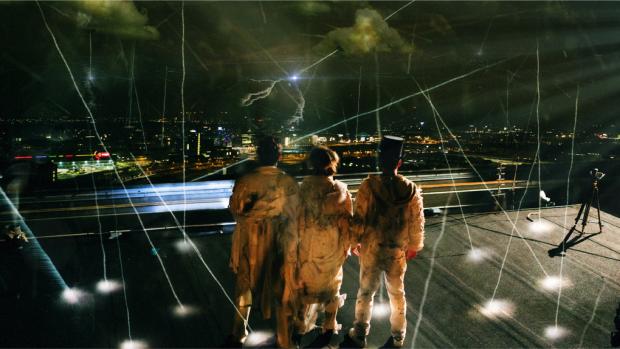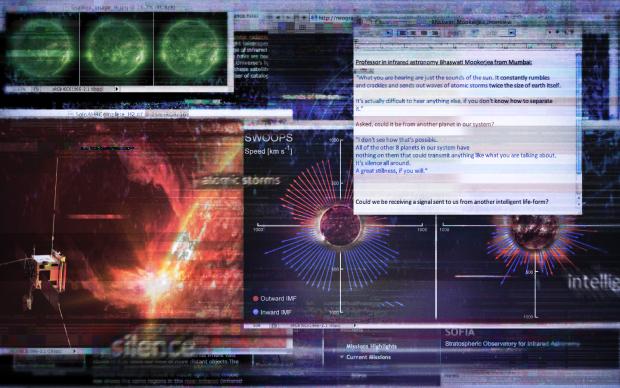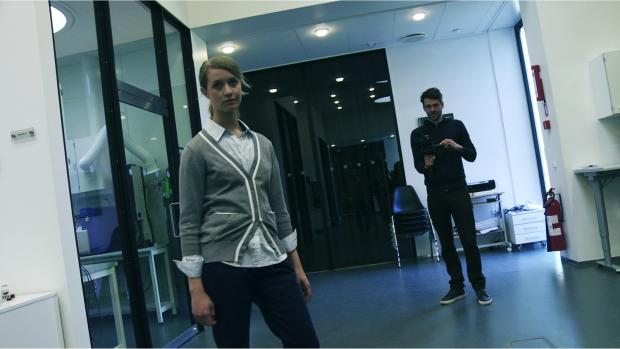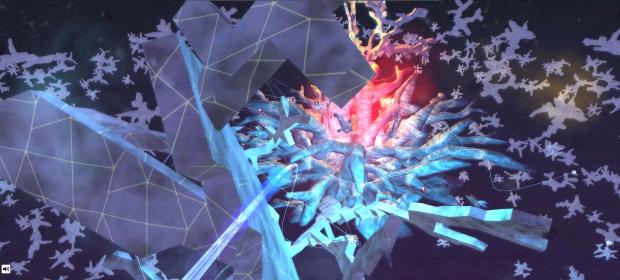Cloud Chamber is an upcoming MMO from Investigate North that puts players in the role of an investigator, of sorts, asking them to actively discuss and compare thoughts about all manner of materials, such as found footage style vignettes and photographs, which are ‘found’ within the digital database that is the Cloud Chamber.
In part one of our chat with Cloud Chamber’s Director, Christian Fonnesbech, we discovered the origins of Cloud Chamber’s creation, its idea, and the spark that defines how the game works. In part two Christian sheds more light on the narrative themes, the reasons behind them, and the artistic intent behind the game. Here, in part three, we discover the issues behind making a game with people that don’t usually make games…
 So Cloud Chamber contains a scientific explanation for God?
So Cloud Chamber contains a scientific explanation for God?
Exactly. To be honest, I think there is one, and it’s actually quite simple. I think that living in a completely rational scientific world and thinking that there’s nothing bigger than us, which I was brought up to do, is really dreary, y’know? I mean it’s this idea of humanity just being this microbe on a rock orbiting an unstable gas explosion.
That is quite a dull way to look at things.
It is, and I at least wanted more somehow, and with Kathleen we really made her into a character that wants this thing that’s more. The meat of the story is really what’s going on with her? Why is she sort of rebelling against everything she’s grown up with? And is this thing she says she seeks, is that true? Because the signal only really manifests itself, or whatever it is, in her head and maybe in her mother’s head, but her mother is dead.
That’s Ingrid?
That’s Ingrid. So that was another thing that we wanted in a game that we don’t think games do so well just yet, and I don’t know if we succeeded, but it’s the idea of character. The idea of hanging out with characters, exploring them and getting to know them and wondering about them and thinking about them and their relationships that they have with each other. And I think, again, this sort of mix of gameplay and found footage and discussion can actually do that. We’ve definitely not gone all the way yet but I think we’ve taken some steps.
So in terms of the story, are you releasing in seasons? Episodic? How will Cloud Chamber be released?
We only have Season 1. If it’s a success then we will start making season 2 as soon as possible. I have a storyline, but I think the investors are waiting to see if this works! The problem is that there’s never really been anything like this before. Adventure games are always single player, and this is kind of a multiplayer adventure game. And multiplayer games aren’t usually about discussion or story.
So usually story is a single player experience, so that part is new in games, and I don’t think I’ve ever seen filmed footage on Steam before. And that’s one of the things we’re really proud of, is that we worked hard with, well, we all know the curse of full motion video – the crappiness of it, and the fact that it doesn’t really belong and all that stuff – and all this narrative dissonance that you get around the film not really working inside the gameplay and the interface, and I mean we really worked hard to make the found footage concept work within the database concept, and everything is an attempt to make these things work together so that it feels natural that there’s actually film footage inside a game, because the game’s about it. And that’s one thing I’m quite proud of, we worked hard on that both in the conceptualisation and game design, but also very much in the way the film is shot and colourised and edited.

Talking about direction and, specifically, working with actors, what were the main script challenges you faced considering you have to keep everything so ambiguous and open to discussion?
That, what you just said, was the main challenge, haha! And it was a huge challenge. I work with a screenwriter from zero to a hundred, we did the scripts together. And then Fabian Wullenweber directs the film clips based on those scripts and based on my sort of tone and vision and so on.
He directed big parts of the original The Killing so we had a really high end team to do that. I could never have directed the clips but I’m more like the series creator, who sits beside the director and says ‘yeah, but, she can’t have said that because she just wrote an email’, and he goes ‘oh, but I didn’t know about the email! Cut!’
I mean I had this really excellent working relationship with Darin Mercado, who’s our screenwriter, and the great thing was that Darin came in with this really strong, classical dramaturgy skills. I mean he could just write a film script. And I came in after 35 Internet game projects.
And we just spent a year basically beating the shit out of each other, because these two things were like oil and water. The ambiguity would destroy the drama, and the drama, or the necessity of telling the story, would destroy the ambiguity. So we had to fight so hard to make sure that both things were in there, and it just meant that it was great. Darin is as stubborn as a mule, and so am I, so neither of us would quit, and neither of us would just be satisfied and say ‘oh ok, we’ll just do it your way’, we’d always be ‘well yes, but that won’t work’, and we’d just keep going until it finally worked.

Did you have trouble conveying this need for ambiguity to the actors, too?
Yeah, this continued all the way down. With the actors, for example, it quickly became clear that, y’know, the scenes are there but there’s so much going on around the scenes with things such as diaries and journals and emails and maps and photographs and all that stuff, and the actors couldn’t know about that. Partly because it hadn’t been written yet. So we constantly had to make sure that they knew what was going on, but that they didn’t shut off any avenues that we might need to explore.
So, during the shooting, there was this constant sense of keeping it alive, somehow, and not letting it die. And the same thing happened during the editing. We had an incredibly good editor called Jacob Thuesen, who edited The Kingdom and things like that, and he’s a very artistic editor, a very big reputation here. He came in and he said ‘Ok, what we got? We’ve got seven weeks to edit this and what have you got? You’ve got ten episodes? And they’re like three minutes each? I can do this in four weeks!’
And he ended up spending twelve weeks. Because it was just a different thing [telling the story in Cloud Chamber] than telling in film because, in a film, you tell the story and if there’s something missing you put it in. But here it’s the gaps that make it exciting. But you still have to have enough continuity and story and drama and character to make it alive and interesting and dramatic. But where’s the line? When do you cross over and start explaining so much that there’s nothing left to discuss?

So we went through more or less the same thing we did with the scripts, we went through in the editing process afterwards. And I remember, in the middle of it, the breaking point was when we were sitting, discussing, and banging our heads against each other’s heads, and Jacob said ‘oh, you want me to make the audience into scientists.’
And I said ‘YES! Yes, that’s it, that’s what it’s all about, it’s that easy.’ Well, it isn’t, but that was exactly it, and that’s what the whole game is about. The whole game is that we’re making the audience into scientists, or detectives, or some kind of mix of those two. But scientists are detectives, y’know? I started going round with a podcast called Radio Lab and listening to them and every time they would have a science term, I’d write them down. And they’d all be like ‘oh, that wasn’t supposed to happen’, and ‘that was so fast I didn’t see it’, ‘it doesn’t usually go like that, does it?’ And it’s obvious after the fact but it’s just that the exciting thing is that science isn’t knowing the answer, it’s not knowing the answer.
That’s what’s exciting, and that’s what this whole thing is, right? It’s taking the answers out of the drama. And that’s why it can become persistent, because you’re never going to find a note in there which says ‘the butler did it’, because as soon as you have that it’s over and it’s just dead meat. We know who did it, I promise you. We know what the signal is, we know who killed Ingrid, or what killed Ingrid, but you’re going to have to work it out from circumstantial evidence.

You wouldn’t be tempted to contribute to the discussion as a player?
Haha! Well, I dunno, but the thing is during the beta test we had one player who wrote – we took all his comments and put them into a word document, font 11 on A4 – he wrote 61 pages. We were so happy with him. For one thing we had to rebalance the scoring system because of him, because everyone was just liking his stuff and he was getting enormous amounts of points, so we had to change the game because of him, but we brought him into the office and I told him the answer.
He’d put so much work into it. He’d done all the scientific theories we’d thought about so he came in and just said ‘so what happened?’ And so I told him not to tell anyone, and I told him ‘this is what happened’. And then one of my colleagues leans over and says ‘well that’s just Christian’s version’, and I’m like ‘and that’s right! That’s exactly it’. It’s like the killing of JFK, we’re never going to get the answer, but we’re going to keep on talking about it and it’s the discussion that’s interesting.
But there is closure. When you get to the end of season 1 I don’t think you’ll be in that much doubt about what happened. But exactly what happened? I mean, I think the way it is now, it’s a satisfying ending for the season, but you’re still not going to know what the signal is, that’s the big one. That’s the series.
Join us in part four for the end of the grand God is a Geek Cloud Chamber interview, in which Christian finally talks about the experience of playing Cloud Chamber.





